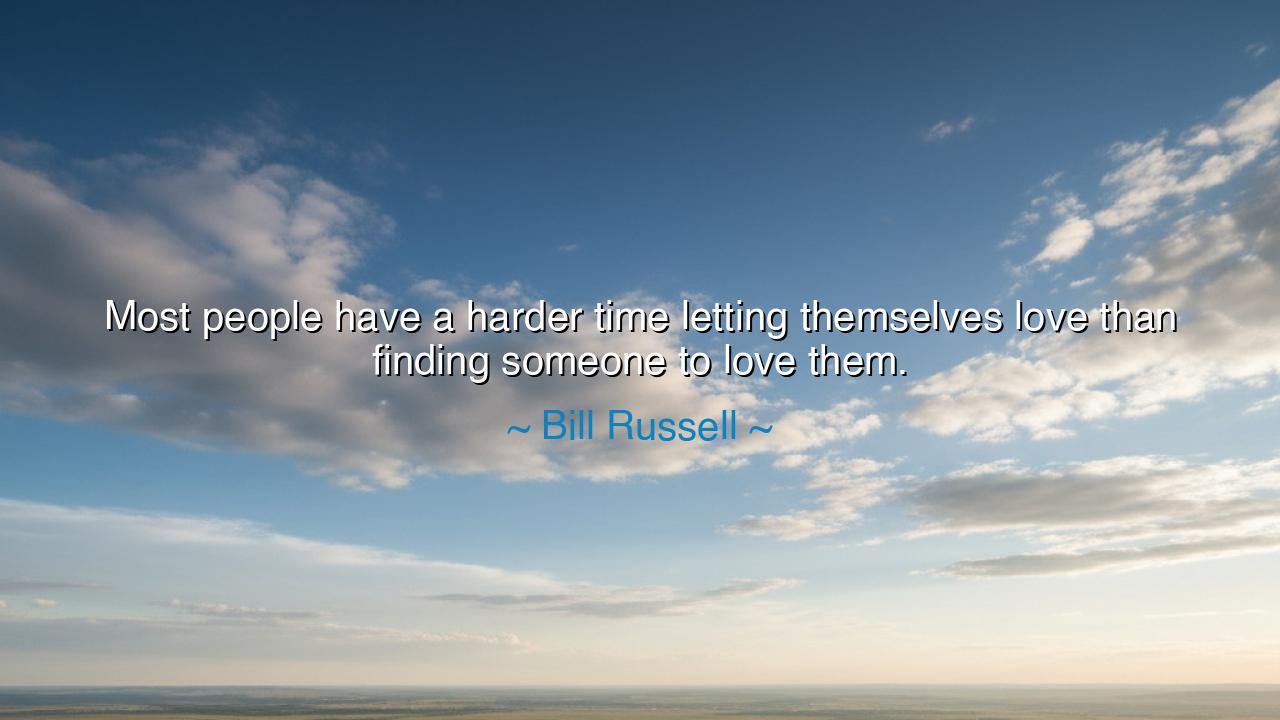
Most people have a harder time letting themselves love than
Most people have a harder time letting themselves love than finding someone to love them.






In the days of old, when men and women sought wisdom not in haste but in the silence of their hearts, sages spoke of the twofold labor of love. One is to receive love when it is offered; the other, far more demanding, is to allow oneself to love without fear, without restraint. Thus spoke Bill Russell, not merely a master of sport but a knower of souls: “Most people have a harder time letting themselves love than finding someone to love them.” These words are no idle ornament; they are a mirror, showing us the struggle between the openness of the heart and the defenses of pride, fear, and pain.
To be loved is often passive. One may sit beneath the sun and the warmth will fall upon the skin, whether one wills it or not. The gaze of another, the affection of a friend, the devotion of kin—these arrive, unbidden, like rain that nourishes the earth. But to let oneself love is active, fierce, and perilous. For to love is to go forth unarmed, to lay bare the breast to arrows unseen, to surrender the fortress of the self and risk the possibility of loss. The soul trembles not because it doubts the sweetness of love, but because it knows the cost of vulnerability.
Consider the tale of Marcus Aurelius, emperor and philosopher. Though clothed in the authority of Rome, he wrote in his Meditations of the need to cherish mankind, even when wronged by them. He understood that love is not merely passion but a discipline of the spirit. Yet even he, who commanded legions, confessed that the heart often resists its duty to extend itself. His greatness lay not only in ruling an empire but in the ceaseless labor of teaching himself to love humanity, even in the face of cruelty. This is the struggle that Russell’s words reveal: that the true battlefield is not in finding someone to offer us their affection, but in training our own soul to give love without retreat.
For love demands courage, as the ancients declared. It is easy to be admired, easy to bask in affection, but far harder to stand before another and say, “Here I am, with all my flaws, and yet I will choose to pour out my care for you.” The poet Rumi spoke of this truth when he said, “Your task is not to seek for love, but merely to seek and find all the barriers within yourself that you have built against it.” These barriers are fear of rejection, wounds of past betrayals, and the false belief that love makes one weak. Yet in reality, love is the fountain of strength, for only the one who dares to love truly lives.
One need only remember the story of Nelson Mandela, imprisoned for twenty-seven years. He had every reason to close his heart to love, to let hatred corrode his spirit. Yet when released, he embraced even his former enemies, showing the world that choosing to love when one could choose bitterness is the highest form of power. Here lies the living example of Russell’s teaching: finding admirers, supporters, or even lovers is simple, but opening one’s own heart to love actively, abundantly, and sacrificially is the hardest and noblest task.
What lesson, then, must we carry? It is this: that to live fully, one must dare not only to accept love but to practice love. Do not wait for the world to prove itself worthy of your affection. Begin with small acts: forgive one who has wronged you, speak kindness where silence would be safer, offer tenderness to those who expect none. Love is not found in grand gestures alone but in daily choices of compassion and generosity.
Therefore, reader, when you hear the words of Bill Russell, hear them as both warning and invitation. Many will find love knocking upon their door, but only the brave will step outside to return it. Do not be among those who guard their hearts so fiercely that they die with treasures unopened. Let your life be marked by the courage to love, for in loving, you will discover the true strength of your soul.
And so I say unto you: Choose love, again and again. Even when it aches, even when it terrifies, even when it asks you to surrender your pride. For in that surrender lies your freedom, and in that freedom lies the essence of what it means to be human.






AAdministratorAdministrator
Welcome, honored guests. Please leave a comment, we will respond soon